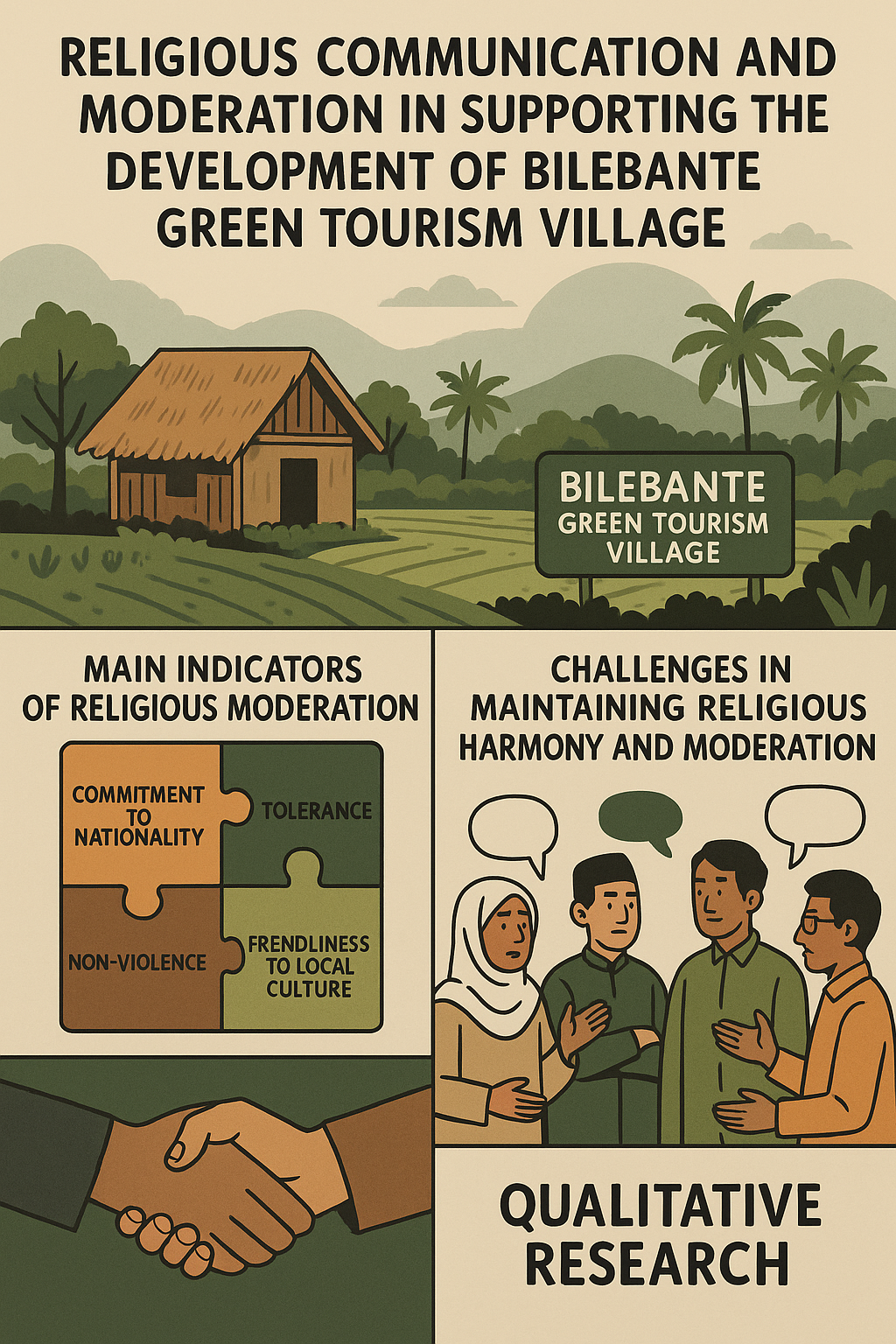COMMUNICATION AND RELIGIOUS MODERATION IN THE DEVELOPMENT OF BILEBANTE GREEN TOURISM VILLAGE, PRINGGARATA DISTRICT, CENTRAL LOMBOK REGENCY
Main Article Content
Abstract
Downloads
Article Details

This work is licensed under a Creative Commons Attribution 4.0 International License.
References
Aditi, I. G. A. (2023). Regulation Of Harmony Between Religious Communities Sourced From The Local Wisdom Of The Lombok Community. Journal of Hindu Religious Law Widya Kerta, 6(1), 60–69. https://doi.org/10.53977/wk.v6i1.1029
Arnstein, S. R. (1969). A Ladder of Citizen Participation. Journal of the American Institute of Planners, 35(4), 216–224. https://doi.org/10.1080/01944366908977225
Ajri, M. (2023). Effective Communication Patterns in Religious Moderation: Building Harmonious Dialogue. Al-Tsiqoh: Journal of Islamic Economics and Da'wah, 8(1), 13-33. https://doi.org/10.31538/altsiq.v8i1.3678
Asrori, M. (2021). "Religious Moderation as a Preventive Strategy for Radicalism and Violence", Al-Tahrir Journal, 21(1), 35–50. https://doi.org/10.21154/altahrir.v21i1.2536
Bennett, M. J. (2013). Basic Concepts of Intercultural Communication: Paradigms, Principles, and Practices. Intercultural Press.
Research and Development Agency and Training of the Ministry of Religion of the Republic of Indonesia. (2019). Religious Moderation: Conceptual Framework and Implementation in Indonesia. Jakarta: Ministry of Religion of the Republic of Indonesia
Daulay, H., Putra, O. E., & Alvaro, B. (2024). Management of Religious Moderation Communication in Maintaining Harmony in the Community (Case Study of Communication Between Islamic and Hindu Figures in Loloan Village, Jembrana, Bali). Administration: Journal of Da'wah Management FDIK IAIN Padangsidimpuan, 6(2), 161–176. https://doi.org/10.24952/tadbir.v6i2.13777
Harnowo, T. (2020). The Application Of Habermas' Discourse Theory As An Alternative To Dispute Resolution. Law Pulpit - Faculty of Law, Gadjah Mada University, 32(1), 55. https://doi.org/10.22146/jmh.45145
Jamaludin, J., Malik, A., & Wahid, A. (2023). Portrait of Religious Moderation Based on Local Wisdom in Nggeru Kopa Hamlet, Donggo District, Bima Regency, NTB. JIIP - Scientific Journal of Educational Sciences, 6(1), 692-700. https://doi.org/10.54371/jiip.v6i1.1603
Fitrisna Widyasari, B., Akiriningsih, T., & Suharto. (2022). Community Participation in Supporting Tourism Activities in Bilebante Green Tourism Village, Central Lombok Regency. Sabbhata Yatra: Journal of Tourism and Culture, 3(2), 94–103. https://doi.org/10.53565/sabbhatayatra.v3i2.638
Hogg, M. A., & Vaughan, G. M. (2020). Social Psychology (8th ed.). Pearson Education.
Jubaedah, S., & Fajarianto, O. (2021). A Tourism Village Development Model Based On Local Wisdom As A Strategy To Improve The Community's Economy In Cupang Village, Gempol District, Cirebon Regency. Abdimas Awang Long, 4(1), 1–12. https://doi.org/10.56301/awal.v4i1.121
Kadek Jelantik, S. (2024). Tourism Communication Model Based On Religious Moderation In Sade Tourism Village, Central Lombok: Tourism Communication. Scientific Development Media, 18(7), 1787–1798. https://doi.org/10.33758/mbi.v18i7.677
Alfian, H. (2021). "Religious Moderation in the Perspective of Multiculturalism", Journal of Religious and Social Studies, 17(2), 132–147. https://doi.org/10.22219/jsam.v17i2.16573
Littlejohn, S. W., & Foss, K. A. (2009). Encyclopedia of Communication Theory. SAGE Publications.
Mustakim, M., Ishomuddin, I., Winarjo, W., & Khozin, K. (2020). Leadership Construction of the Giri Kedaton Tradition as the Socio-Cultural Identity of the People of Gresik Regency. FPIPS Communication Media, 19(1), 11. https://doi.org/10.23887/mkfis.v19i1.23250
Musriadi, M., & Jauhari, A. (2023). Building Religious Moderation Attitudes Through Instilling the Values of Local Wisdom Yasisoppengi as a Model of Da'wah Bil Hikmah in the Perspective of the Qur'an. Al Karima: Journal of the Study of the Science of the Quran and Tafsir, 7(1), 1-15. https://doi.org/10.58438/alkarima.v7i1.154
Mubarak, N., Said, N., & Saidy, E. N. (2024). Revitalization of Local Culture in the Framework of Religious Moderation. Community Space: Journal of Community Service, 2(2), 43-54. https://doi.org/10.24252/rkjpm.v2i2.51140
Tarigan, I. S., Saragih, R., Simorangkir, J., Marbun, R. C., & Ambarita, E. (2023). The Construction of Religious Moderation in Local Culture: A Study on Interaction Between Religious Believers in Kampung Melayu, Hutagalung, North Tapanuli. CURIOUS, 10(1), 1-15. https://doi.org/10.30995/kur.v10i1.949
Musriadi, M., & Jauhari, A. (2023). Building Religious Moderation Attitudes Through Instilling the Values of Local Wisdom Yasisoppengi as a Model of Da'wah Bil Hikmah in the Perspective of the Qur'an. Al Karima: Journal of the Study of the Science of the Quran and Tafsir, 7(1), 1-15. https://doi.org/10.58438/alkarima.v7i1.154
Pantiyasa, I. W. (2018). COMMUNITY BASED TOURISM DEVELOPMENT IN COMMUNITY EMPOWERMENT (Case study in Bedulu Village, Blah Batuh, Gianyar). Scientific Journal of Hospitality Management, 1(2). https://doi.org/10.22334/jihm.v1i2.68
Pratama, T. A., & Harahap, N. (2024). The Role of Intercultural Communication in Strengthening Religious Moderation in the Community of Medan City (Analysis of FKUB in Medan). Indonesian Journal : Informatics and Communication Management, 5(2), 2081–2095. https://doi.org/10.35870/jimik.v5i2.819
Putnam, R. D. (2000). Bowling Alone: The Collapse and Revival of American Community. Simon & Schuster
Rosenberg, M. B. (2003). Nonviolent Communication: A Language of Life. PuddleDancer Press
Zahira Athiya Ramadhani, Jumraidin, J., & H. Lalu Ratmaja. (2024). Communication Techniques Of Local Tour Guides In The Interpretation Process Of Bilebante Green Tourism Village. Juremi: Journal of Economic Research, 3(6), 911–918. https://doi.org/10.53625/juremi.v3i6.7706
Zahra, A. (2011). “Sustainable Tourism Indicators for Managing Community-Based Ecotourism”, Tourism Management Perspectives, 2–3, 61–68. https://doi.org/10.1016/j.tmp.2011.09.004

